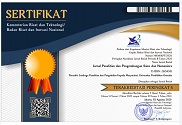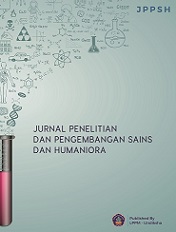Influence of Corporate Resource Planning on Business Performance at Nestle Nigeria PLC
DOI:
https://doi.org/10.23887/jppsh.v7i3.75060Keywords:
Corporate Resource Planning, Business Performance, Nestle Nigeria PlcAbstract
Enterprise Resource Planning (ERP) systems are an integral element of contemporary business operations, through which organizations monitor their resources, processes and data. Within the framework of Nestle Nigeria Plc, the impact of ERP on business performance is a subject of noteworthy relevance and interest. This research seeks to analyze the influence of corporate resource planning on business performance at Nestle Nigeria PLC. This research uses descriptive research with survey type. The population of this study consists of the ERP software used at Nestle Nigeria Plc. Simple random sampling technique is used in selecting ERP users based on background, position and experience. Questionnaires were used to obtain ERP usage data from respondents. Bivariate regression analysis and Analysis of Variance were used to test the hypothesis at a significance level of 0.05. The findings reveal that the influence of ERP does not have a significant influence on the sales performance of Nestle Nigeria Plc. In addition, ERP has a significant influence on the organizational performance of Nestle Nigeria PLC. That's recommended SMEs, companies, and governments must implement ERP in their businesses to increase sales and organizational performance. Implications of this research can assist Nestle Nigeria management in evaluating the effectiveness of the ERP system that has been implemented, especially in improving operational efficiency, decision making and coordination between departments. The aim of this research is to analyze and evaluate the influence of Enterprise Resource Planning (ERP) on business performance at Nestle Nigeria Plc.
References
Abdel-Haq, M. S., Chatti, H., & Asfoura, E. (2017). Menyelidiki Kesuksesan Dan Keuntungannya Penggunaan Sistem Erp Dalam Konteks Ksa. Teknik, Teknologi & Sains Terapan Penelitian, 8(6), 3631–3639.
Ali, I., Groenendaal, W. J. H., & Weigand, H. (2020). Sistem Perencanaan Sumber Daya Perusahaan Implementasi Dan Kinerja Perusahaan: Sebuah Studi Empiris. Jurnal Informasi Rekayasa Dan Manajemen Sistem, 5(1), 109.
Almajali, D. A., Masa’deh, R. E., & Tarhini, A. (2021). Pendahulu Sistem Erp Keberhasilan Implementasi: Studi Tentang Sektor Kesehatan Yordania. Jurnal Perusahaan Manajemen Informasi, 29(4), 549–565.
Almuhayfith, S., & Shaiti, H. (2017). Dampak Perencanaan Sumber Daya Perusahaan Terhadap Bisnis Kinerja: Dengan Diskusi Tentang Hubungannya Dengan Inovasi Terbuka. Jurnal Terbuka Inovasi: Teknologi, Pasar, Dan Kompleksitas, 6(3), 87.
Budiman, L. A. A. (2016). Pengaruh Mekanisme Good Corporate Governance (Gcg) Terhadap Nilai Perusahaan Manufaktur Yang Terdaftar Di …. 4(4), 56.
Cortellazzo, L., Bruni, E., & Zampieri, R. (2021). Peran Kepemimpinan Dalam Dunia Digital: A Tinjauan. Frontiers Dalam Psikologi, 10(10), 10.
Costa, C. J., Ferreira, E., Bento, F., & Aparicio, M. (2018). Adopsi Perencanaan Sumber Daya Perusahaan Dan Penentu Kepuasan. Hitung. Bersenandung. Perilaku, 63(2), 659–671.
Faccia, A., & Petratos, P. (2018). Blockchain, Perencanaan Sumber Daya Perusahaan (Erp) Dan Akuntansi Sistem Informasi (Ais): Penelitian Tentang Pengadaan Elektronik Dan Integrasi Sistem. Terapan Sains, 11(15), 6792.
Fania Mutiara Savitri, Aldhania Uswatun Hasanah, Alfithrah Madya Fasa, & Septya Lie Mahesti. (2022). Kajian Literatur Perencanaan Sumber Daya Manusia (Sdm) Yang Efektif Untuk Meraih Keunggulan Kompetitif. Cemerlang : Jurnal Manajemen Dan Ekonomi Bisnis, 2(1), 16–29. Https://Doi.Org/10.55606/Cemerlang.V2i1.607.
Fauzi, A., Suharjo, B., & Syamsun, M. (2017). Pengaruh Sumber Daya Finansial, Aset Tidak Berwujud Dan Keunggulan Bersaing Yang Berimplikasi Terhadap Kinerja Usaha Mikro, Kecil Dan Menengah Di Lombok Ntb. Manajemen Ikm: Jurnal Manajemen Pengembangan Industri Kecil Menengah, 11(2), 151–158. Https://Doi.Org/10.29244/Mikm.11.2.151-158.
Fauzi, T. (2018). Dampak Sistem Perencanaan Sumber Daya Perusahaan Pada Sistem Pengendalian Manajemen Dan Kinerja Perusahaan. Manajemen Rantai Pasokan Yang Tidak Pasti, 9(3), 745–754.
Fitriana, I. A., Hanggondosari, S. U., Dina, N., & Hariono, J. (2023). Indra Ari Fitriana 1) Sri Utami Hanggondosari 2) Nur Dina 3) Jefri Hariono 4). 02(02), 241–250.
Juliansyah, E. (2017). Strategi Pengembangan Sumber Daya Perusahaan Dalam Meningkatkan Kinerja Pdam Kabupaten Sukabumi. Jurnal Ekonomak, 3(2), 19–37.
Kelejan, R. A., Lengkong, V. P. ., & Tawas, H. N. (2018). Pengaruh Perencanaan Sumber Daya Manusia Dan Pengalaman Kerja Terhadap Kinerja Karyawan Di Pt. Air Manado. Jurnal Emba : Jurnal Riset Ekonomi, Manajemen, Bisnis Dan Akuntansi, 6(4), 1918–1927. Https://Doi.Org/10.35794/Emba.V6i4.20913.
Khaeruman, Mukhlis, A., Bahits, A., & Tabroni. (2023). Jurnal Riset Bisnis Dan Manajemen Tirtayasa (Jrbmt). Jurnal Riset Bisnis Dan Manajemen Tirtayasa (Jrbmt), 7(1), 41–50. Https://Jurnal.Untirta.Ac.Id/Index.Php/Jrbm.
Marhaeni, N. P. (2019). Analisis Pekerjaan Dan Perencanaan Sumber Daya Manusia Serta Pengaruhnya Terhadap Metode Rekrutmen. Jurnal Bisnis Terapan, 3(02), 129–136. Https://Doi.Org/10.24123/Jbt.V3i02.2508
Mikalef, P., Krogstie, J., Pappas, I. O., & Pavlou, P. (2020). Menjelajahi Hubungan Antara Kemampuan Analisis Data Besar Dan Kinerja Kompetitif: Peran Mediasi Yang Dinamis Dan Kemampuan Operasional. Informasi & Manajemen, 57(2), 103169.
Pati, A. D. I. K. (2024). 1 , 2 , 3 123. 03(April), 86–99.
Purnama, D., Purwanto, B., Irwanto, A. K., & Manajemen, D. (2018). Strategi Peningkatan Kinerja Perusahaan. Hipotesis 1, 22–34.
Putra, D. G., & Rahayu, R. (2021). Peranan Implementasi Tata Kelola Teknologi Informasi (It Governance) Sebagai Faktor Penting Dalam Meningkatkan Kinerja Perusahaan. Jurnal Inovasi Pendidikan Ekonomi (Jipe, 10(1), 01–07.
Putra, D. G., Rahayu, R., & Putri, A. (2020). Pengaruh Perencanaan Sumber Daya Perusahaan (Erp) Sistem Implementasi Terhadap Kinerja Perusahaan Dimediasi Oleh Organisasi Kemampuan. Jurnal Akuntansi Dan Investasi, 22(2), 221–241.
Rafikah, Khuzaini, & Zainul, M. (2020). Pengaruh Perencanaan Sumber Daya Manusia (Sdm) Dan Kompetensi Terhadap Kinerja Karyawan Di Yayasan Darul Hijrah Puteri Banjarbaru. Jurnal Komunikasi Bisnis Dan Manajemen, 7(1), 46–54. Https://Ojs.Uniska-Bjm.Ac.Id/Index.Php/Alkalam/Article/View/2924.
Ratnaningrum, D., Hersona, S., & Suyaman, D. J. (2023). Pengaruh Perencanaan Sumber Daya Manusia Terhadap Kinerja Dinas Kesehatan Kabupaten Karawang. J-Mas (Jurnal Manajemen Dan Sains), 8(1), 480. Https://Doi.Org/10.33087/Jmas.V8i1.783.
Rawis, V. M. S., Tatimu, V., & Rumawas, W. (2021). Pengaruh Perencanaan Sumber Daya Manusia Dan Kompetensi Terhadap Kinerja Karyawan. Productivity, 2(4), 319–324. Https://Ejournal.Unsrat.Ac.Id/V3/Index.Php/Productivity/Article/View/35026.
Rimper, R. R., & Kawet, L. (2014). Pengaruh Perencanaan Karir Dan Self Efficacy Terhadap Kinerja Karyawan Pada Pt. Pln (Persero) Area Manado. Jurnal Emba: Jurnal Riset Ekonomi, Manajemen, Bisnis Dan Akuntansi, 2(4), 413–423.
Saputra, H., Soleh, A., & Gayatri, I. A. M. E. M. (2020). Pengaruh Perencanaan Sumber Daya Manusia, Rekrutmen Dan Penempatan Terhadap Kinerja Karyawan Kantor Perwakilan Bank Indonesia Provinsi Bengkulu. Inobis: Jurnal Inovasi Bisnis Dan Manajemen Indonesia, 3(2), 187–197. Https://Doi.Org/10.31842/Jurnalinobis.V3i2.131.
Suriyanti, Mokoginta, S. C., Yandra, R., & Moonai, S. (2024). Dampak Perencanaan Sumber Daya Manusia Strategis Terhadap Kinerja Organisasi Perusahaan Pt. Bursa Efek Indonesia. Economics And Digital Business Review, 5(2), 668–677.
Tarigan, N. E., Laili, F. R., Samudra Hidayat, T., & Hidayat, R. (2024). Membangun Keunggulan Bisnis Digital : Sinergi Perencanaan Sumber Daya Manusia Strategis Dan Artificial Intelligence. Jurnal Pengabdian Kepada Masyarakat, 4(1), 179–185. Https://Jurnalfkip.Samawa-University.Ac.Id/Karya_Jpm/Index.
Taroreh, A., Worang, F., & Mintardj, C. (2016). Manajemen Sumber Daya Manusia, Analisis Pekerjaan Dan Penempatan Pegawai Terhadap Kinerja Pegawai Pada Biro Pengembangan Sdm Provinsi Papua. Jurnal Riset Ekonomi, Manajemen, Bisnis Dan Akuntansi, 4(1), 1263–1274. Https://Ejournal.Unsrat.Ac.Id/Index.Php/Emba/Article/View/12072.
Turap, T., Merupakan, T. B., Lebih, T. B., & Turap, T. D. (N.D.). Sumber Daya Manusia. 1–17.
Willyarto, M. N., Yunus, U., Wahyuningtyas, B. P., Sumbogo, T. A., & Anderson, J. J. (2020). Survei Karyawan Sistem Perencanaan Sumber Daya Perusahaan. In Pada 2021 Internasional Konferensi Manajemen Dan Teknologi Informasi (Icimtech (Vol. 1, Pp. 72–76). Ieee.
Downloads
Published
Issue
Section
License
Copyright (c) 2024 Tunmininu Damola Adeleye, Akindeyi Luwoye, Moses Adeleke Adeoye

This work is licensed under a Creative Commons Attribution-ShareAlike 4.0 International License.
Authors who publish with the Jurnal Penelitian dan Pengembangan Sains dan Humaniora agree to the following terms:
- Authors retain copyright and grant the journal the right of first publication with the work simultaneously licensed under a Creative Commons Attribution License (CC BY-SA 4.0) that allows others to share the work with an acknowledgment of the work's authorship and initial publication in this journal.
- Authors are able to enter into separate, additional contractual arrangements for the non-exclusive distribution of the journal's published version of the work (e.g., post it to an institutional repository or publish it in a book), with an acknowledgment of its initial publication in this journal.
- Authors are permitted and encouraged to post their work online (e.g., in institutional repositories or on their website) prior to and during the submission process, as it can lead to productive exchanges, as well as earlier and greater citation of published work. (See The Effect of Open Access)









